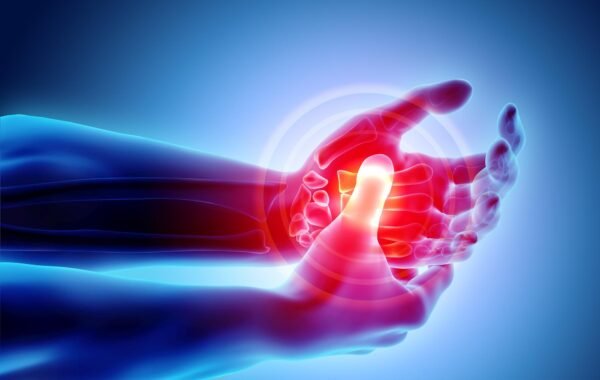Rheumatoid Arthritis
What is Rheumatoid Arthritis?
It is a chronic systemic inflammatory disease of unknown aetiology that primarily involves the joints’ synovial lining causing pain, swelling, redness, deformity, etc. It may also impair few other organ systems like – the eyes, lungs, various tendons, skin, circulatory system, and heart. The basis of such symptoms is the erroneous behaviour of our immune system. The body’s immune system’s various components mistakenly attack its healthy cells in the body -causing inflammation (painful swelling) of the affected parts. The most commonly affected joints are the knuckles of the hands, wrists, knees, ankles and feet. The affection of the joints is mainly found symmetrical on both sides of the body. Globally, RA affects approximately 1% of the entire population.
In RA, the synovial membrane (lining of joints) becomes inflamed, causing joint tissue damage, which produces long-lasting pain, joint swelling, instability, and deformity.

Why does it happen?
To date, medical science doesn’t know the cause behind the immune system’s erratic behaviour against its own body. The signs and symptoms of Rheumatoid Arthritis, i.e. synovitis, swelling, and joint damage, are the results of very complex autoimmune and inflammatory processes involving the components of both the innate & adaptive immune systems.
What are the signs and symptoms of RA?
- Pain in affected joints causing disability of regular daily activity.
- Long-lasting stiffness in and around affected joints.
- Symmetrical – involves same joints areas on both sides.
- Multiple- it commonly involves three or more joints area.
- Weight loss, weakness.
- Occasional Fever
Risk factors
There are certain factors that increase the risk of developing Rheumatoid factors.
- Age -RA can occur at any age but more incidence at increasing age
- Gender-3 times more common in females than males.
- Genetic background- RA strongly associated with human leukocyte antigen (HLA)-DRB1 alleles, and chances of symptoms are high in patients who are positive for rheumatoid factor (RF) and anti-citrullinated protein antibody (ACPA).
- Smoking -increases the risk of developing RA or worsen the case
- Obesity -increases the risk because the extra body weight on the joint increases the symptoms.
- A person developed an early habit of smoking double the chances of RA.
- Children of poor socio-economic conditions are more prone to develop RA. Milestone error-
Whereas, there is a piece of good news that breastfeeding for about 2 yrs lowers a woman’s risk for rheumatoid arthritis.
How is RA diagnosed?
- Physical Sign and Symptoms-
-
- Morning stiffness supports the diagnosis.
- Stiffness in multiple and bilaterally symmetrical joints
- Deformity and inflammation in affected joints
- X-Ray -narrowing of joints spaces, articular erosion is present, which is diagnostic of RA.
- Lab tests-
Rheumatoid factor:-Though it is not specific to RA and may be present in patients with other diseases, e.g. hepatitis C. But 50% – 80 % of persons with RA have higher rheumatoid factor and ACPA
-
- Antinuclear antibody (ANA):- For prognostic importance, especially for RA in children
- C-reactive protein levels and ESR:- these are commonly elevated.
What is self-help for RA? How can Homeopathy help?
Few alterations in daily activity might help to get relief from RA are-
- Simple and regular exercise: Swimming, Cycling are suitable for muscles strength, but please do in moderation.
- A short brisk walk with an interval of rest- help to reduce stiffness.
- Keep an eye on weight.
- Please include milk and dairy products in meals to get the required amount of vitamins D and calcium. Add a good quantity of fruits and vegetables to your diet.
Role of Homoeopathy in RA:
There are multiple medicines found to be effective in cases of RA by various stalwarts in Homeopathy. Homoeopathic medications like Rhus Tox, Arnica, Apis Mel, Belladonna, Calcarea Carb, Causticum, Bryonia, Dulcamara, Ruta, Guaiacum etc. very helpful in cases of RA.
Homoeopathic medicines help to give relief without any side effects in the body. A well-qualified homoeopath can select the appropriate medication only after a thorough evaluation of the entire symptomatology. We strongly advise not to experiment or self-prescribe any homoeopathic medicines since self-prescription can prove harmful. Parents are not encouraged to self-prescribe any of the Homeopathic medications without consulting an appropriately qualified doctor from a recognized university.
So, why wait? Get a consultation with a qualified and experienced Homeopath today from the comfort of your home through Let’s Homeopathy!
We will deliver the medicines to your door-step too!